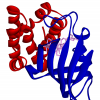Intermittent dosing with rapamycin breaks inflammatory loop that fuels tumor relapse and age-related diseases
Novato, CA/June 30, 2015: Intermittent dosing with rapamycin selectively breaks the cascade of inflammatory events that follow cellular senescence, a phenomena in which cells cease to divide in response to DNA damaging agents, including many chemotherapies. The finding, published in Nature Cell Biology, shows that once disrupted, it takes time for the inflammatory loop to reestablish, providing proof-of-principal that intermittent dosing could provide a way to reap the benefits of rapamycin, an FDA-approved drug that extends lifespan and healthspan in mice, while lessening safety issues associated with its use.
“We think this could provide a paradigm shift in the treatment of age-related disease, including cancer,” said Buck professor Judith Campisi, PhD, senior scientist on the study. “Imagine the possibility of taking a pill for a few days or weeks every few years, as opposed to taking something with side effects every day for the rest of your life. It’s a new way of looking at how we could deal with age-related maladies.”
Campisi’s team, led by postdoctoral fellow Remi-Martin Laberge, PhD, who discusses the work on the SAGE blog, collaborated with teams led by Peter Nelson, MD, at the Fred Hutchinson Cancer Research Center and Pankaj Kapahi, PhD, at the Buck Institute. They showed that rapamycin reduced the secretion of inflammatory cytokines from senescent cells in culture and in mice by suppressing the mTOR pathway, which promotes growth. The team gave rapamycin to mice with prostate cancer -- after they had been treated with DNA-damaging chemotherapy. Describing the inflammatory loop associated with senescence, Campisi said the results could impact current treatment of cancer patients. “DNA-damaging chemotherapy causes senescence, both to the tumor and its microenvironment. The tumor shrinks but the immediate tissue environment is inflamed. We think signals from those inflamed cells trigger residual cancer cells to grow again. In the mice, rapamycin suppressed the ability of the tumor cells to relapse.” Most importantly, Campisi said the results may help explain why rapamycin has had mixed results as a treatment for cancer. “It’s being given to patients as a way of stopping the growth of tumors. But we think that rapamycin may also be beneficial for those tumors that are driven by inflammation,” she said. “It needs to be tested in a population most likely to benefit.”
Nelson, a member of the Human Biology and the Public Health Sciences Divisions at Seattle’s Fred Hutchinson Cancer Research Center, hopes to do just that. A practicing oncologist who specializes in treating prostate cancer, Nelson is planning a clinical trial utilizing rapamycin together with standard treatments. “Blocking the damage response in normal cells that have been bathed in chemotherapy could be instrumental in keeping errant or dormant cancer cells from starting down the path to proliferation,” he said. “We are eager to test this in select patients.”
“These findings may indeed have applicability for both aging and tumor growth,” said Harvey Cohen, MD, Director, Center for the Study of Aging & Human Development at Duke University’s School of Medicine. “Senescence-activated inflammation could be driving the increased incidence of cancer that we see with aging.” Dr. Cohen, whose research program includes studies on cancer in the elderly and molecular pathways that lead to functional decline, said. “While this study took place in mice, the work sets the scene to do early clinical trials in humans. Inflammation has a role in almost all tumor development and some cancers are more inflammatory than others. It would be interesting to see the effect that rapamycin has on those tumors and the surrounding tissue.”
Laberge said the paradigm-shifting potential of intermittent dosing is based on the fact that it takes time for the inflammatory loop (fueled by the senescence-associated secretory phenotype or SASP) to form and time for it to re-establish itself after a brief treatment of rapamycin. “Rapamycin blocks the production of a protein called IL-1alpha. This in turn, suppresses IL6, a well-known inflammatory cytokine, at the level of transcription, which prevents the production of the IL6 protein,” said Laberge. “Because it acts at a deeper level within the cellular process it takes longer for it to get started again.” He also points out that treatment with rapamycin selectivity impacts the SASP, preserving the function of factors essential for wound healing. “It’s an elegant solution – imagine using a small hammer to delicately knock out one thing that is causing problems. We knocked it out and it stayed out long enough to benefit the health of the animal.”
The study is expected to generate interest in the age research field among scientists studying rapamycin and its analogs as they look for ways to forestall late-life diseases. Rapamycin is an immune modifier first used after kidney transplant. While there is a lot of excitement about the drug, which improved seniors’ response to the flu vaccine in a clinical trial last year, there are concerns about its side effects, especially with long-term use. Rapamycin can make patients susceptible to some opportunistic infections and has been linked to hyperglycemia, which can cause type 2 diabetes, and high levels of triglycerides in the blood, which can contribute to heart disease. “We have yet to fully understand why suppressing the mTOR pathway via rapamycin increases lifespan and healthspan in mice. This work helps illuminates the puzzle,” said Campisi. “Perhaps the mice are living longer because they have less overall inflammation, and maybe intermittent dosing will make it possible for us to use it more widely in humans.”
Citation: Nature Cell Biology: mTOR Regulates the Tumour-Promoting Senescence-Associated Secretory Phenotype by Promoting IL-1a Translation























































